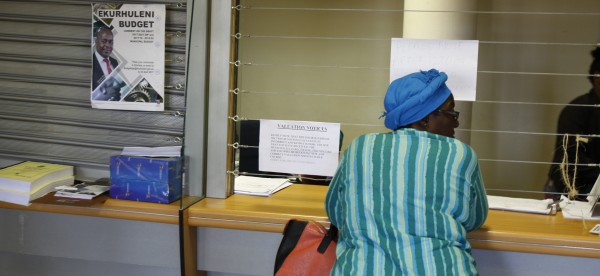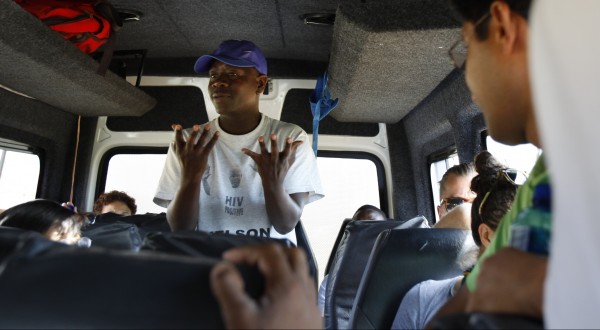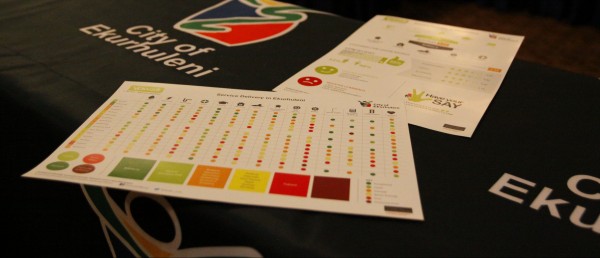The main challenge that Yowzit has faced in scaling up our model of transparency and accountability has been in going beyond the traditional user base of our ratings-and-review platform. We have tried to go beyond our predominantly suburban, middle class users, who have access to connectivity, to ensure that our platform is more representative of the demographics of South Africa - by including blue collar, mostly township-based users, with limited access to connectivity.
We have also faced the challenge of how we move beyond reviews of services, towards deepening engagement between social actors by enabling government representatives to respond to reviews posted on our platform.
As the research and learning leader in the Making All Voices Count (MAVC) consortium, the Institute for Development Studies (IDS) convened a learning event for the programme in South Africa in March 2017.
One day was dedicated to a set of site visits for participants to get a first-hand sense of how efforts at ‘responsive government’ have been panning out. We were requested to host one of these site visits to allow participants to look at how the new partnership between Yowzit, CSOs and the Ekurhuleni municipality is evolving; and how these collaborations are working towards effecting improvements in the way that government is responding to citizens’ issues and needs.
These kinds of visits offer both sets of teams - hosts and visitors - the opportunity to learn through conversation, ventilate views and interact in a meaningful way with all partners involved in the implementation of the project. As the hosting team, we designed the day to enable the site visit group to get a deeper understanding of the context that the CONNECT-TECH project is being implemented in.
We chose two locations where we are working actively, that are representative of the South African socio-economic reality. The first area that we visited was Vosloorus, a township in the southern region of the municipality. The second area that we visited was the town of Alberton.
First stop – a Customer Care Centre
Our first stop in Vosloorus was the Customer Care Centre (CCC), a walk-in service delivery hub located within a government precinct, where people can pay bills, submit service queries and follow up on previously submitted queries. We conducted a demonstration of a typical Yowzit Activation Day and how we engage people coming and going at the CCC and the script used to introduce the concept of the work that we are doing.

Vosloorus Customer Care Centre (Duncan Edwards/Making All Voices Count)
Thereafter the group had a session with the CCC Manager Ms Mila Mohlathe. She made a presentation of the work of the CCC and the points of intersection between their department and service delivery departments. Various questions were asked to Ms Mohlathe about the relationship with Yowzit and the impact of the Yowzit technology-driven approach to citizen-government engagements on their work, and how these results are influencing their engagements with citizens. What was clear from Ms Mohlathe’s response was that their and our data plays an important role in promoting awareness of where services are faltering, where service standards are met and enabling deliberate actions to be taken by her team to resolve these challenges.
We then visited Thelle Mogoerane regional hospital, but unfortunately, due to red tape, we were unable to access the facility. But Yowzit’s community partner, the local chapter of the Treatment Action Campaign (TAC), took the opportunity to offer their perspective on the public healthcare system in Ekurhuleni and in particular the history and service record of the Thelle Mogoerane facility to date. This highlighted how Yowzit does not rely only on platform-generated data, or even surveys, for its engagement with government on the results of its ‘ratings and reviews’ work - but also on this kind of triangulated qualitative information.
Second stop - a small local public healthcare day facility
Our next stop was Dresser Clinic, a small local public healthcare day facility. Upon arrival we did a short tour of the facility and were introduced to the head of the clinic. TAC, as part of its health activism work, does regular monitoring of primary health care facilities and hospitals where they have presence.
The TAC activists were able to provide a deeper context to the facility - where service standards are being met and where they are not - and what some of the underlying challenges are and the responsiveness of the local municipality to those challenges.

TAC activist talking to learning event participants en route to the Dresser Clinic. (Duncan Edwards/Making All Voices Count)
What came through from the TAC observations is that while there has been a significant amount of work done to capacitate the health system in Ekurhuleni, there are still significant challenges that exist. It was clear to us all that TAC’s work to highlight the challenges and successes of the health system is an important independent monitoring role. This independence and advocacy approach means that at times TAC is collaborative but at times adversarial when dealing with the municipality.
Last stop - meeting with Customer Relations Management executives
Our last stop of the day was a question and answer session with Customer Relations Management (CRM) executives - Ms Thandi Radebe and Mr James Murphy. Thandi presented an outline of the CRM department, its objectives, and how it goes about fulfilling those objectives and programmes currently underway. What was clear from the ensuing discussion was that there was keen interest in the Yowzit-Ekurhuleni Metro Municipality collaboration and the extent to which the Yowzit data is influencing the internal processes of the municipality and municipality’s responsiveness to the needs of the various communities it serves.

Yowzit's heatmap of service delivery in Ekurnhuleni Municipality (Duncan Edwards/Making All Voices Count)
What was clear from all the municipal representatives was that they see Yowzit’s value as providing an independent view of the municipalities performance as expressed directly by the Ekurhuleni residents. The metro officials see this as adding credibility to their own internal surveys and studies that are conducted. It also highlighted the willingness and commitment of the CRM Department towards customer engagement using different methodologies.
The Yowzit CONNECT-Tech Project is being included in the CRM Department’s campaign management programme that is tasked with collating all the customer interaction data into one comprehensive data source that CRM management can use to track departmental performance from a 360-degree perspective.
Reflecting on the work done so far
The site visit presented us - the Yowzit and partners implementation team - with an opportunity to reflect on the work done so far, and the progress that we are making in shifting power relations between different social actors. Though there is a lot to be proud of, we are not losing sight of the fact that meaningful change takes time, and that we need to remain committed to achieving impact within society.
For Yowzit going forward, we see a need to continue to experiment with different ways of activating voice, building a community of active participants and continuously emphasising the need for deeper and more meaningful discussions amongst all social actors.
From our perspective, the site visit group from the learning event were able to get a visual picture of how we work, have a sense of our partnership relationships, and of the complexity of the work that is needed with different stakeholders that traditionally see themselves as diametrically opposed, and our efforts to forge collaboration using technology to facilitate discussion and action to strengthen responsive local governance.
About the author
Keke Molebatsi is Yowzit's Project Manager.Related content
-
PUBLICATION | May 16, 2017
More accountable and responsive governance: how do technologies help make… -
BLOG | June 1, 2017
The story of two tech platforms -
BLOG | July 26, 2016
'Empowering the empowered’: citizen voices in South Africa -
PROJECT | August 13, 2015
Yowzit: Online ratings service for public services in South Africa -
PUBLICATION | November 17, 2016
Lessons from Yowzit's practitioner research and learning process -
PROJECT | November 10, 2016
Connect-Tech: Connecting citizens and government through technology